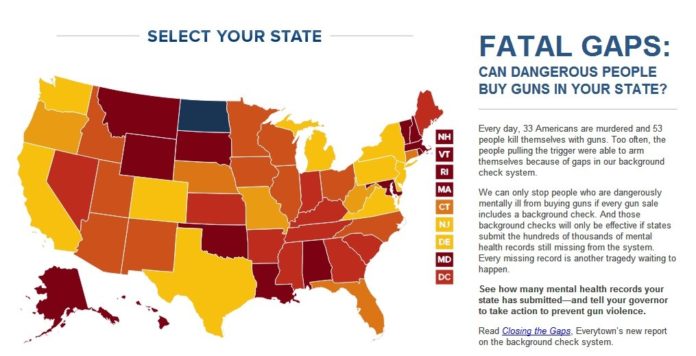
NEW YORK – A report released Thursday by gun-violence prevention group Everytown for Gun Safety found that Rhode Island is among 12 states that have reported fewer than 100 records to the National Instant Criminal Background Check System designed to help keep individuals considered dangerously mentally ill from purchasing guns.
The report, based on new FBI data, showed that the number of mental health records in the NICS has tripled in the United States in less than three years. Rhode Island is the only state in the country that has not submitted any mental health records since 2011.
Massachusetts (which submitted one mental health record), New Hampshire (two records) and Vermont (24 records) were also among states that Everytown for Gun Safety said have left “fatal gaps” in the NICS system.
Despite these gaps, however, the organization reoprted that in 2013 there were three times as many records in the system than in 2011, and 65 percent more dangerously mentally ill individuals who tried to buy guns were blocked from purchasing guns compared with two years earlier.
Everytown for Gun Safety updated its online Fatal Gaps heat map to show each state’s progress in reporting mental health records and released a new report, “Closing the Gap”, which documents the steps states have taken to improve record-sharing and ensure that seriously mentally ill individuals — who are federally prohibited from buying firearms — are blocked when they try to purchase a gun.
“The news that 65 percent more gun sales have been blocked to seriously mentally ill individuals is proof of how important it is for states to submit their records and close the potentially fatal gaps in our background check system,” said John Feinblatt, president of Everytown for Gun Safety. “We’ve been calling attention to this problem for years. Many states have heard our call but there are still too many states that are not doing their part to ensure that dangerous people cannot get their hands on guns and we know that it only takes one missing record to shatter a community.”
Among the states that reported large increases in mental health record submissions since the November 2011 Fatal Gaps release were Pennsylvania, which increase submissions from one record in 2011 to 676,968 records in 2013; New Jersey, from 15 records to 411,879 records; Delaware, from zero records to 19,573 records; Oregon, from three records to 29,659 records; and California, from 279,589 records to 563,458 records.
Everytown for Gun Safety attributed the improvement in records submissions in part to the organization’s report “Fatal Gaps: How Missing Records in the Federal Background Check System Put Guns in the Hands of Killers,” released three years ago to bring attention to how missing records in the background check system allow dangerously mentally ill people such as the gunman in the 2007 Virginia Tech shooting to pass background checks and buy guns.
The complete list of states that have submitted fewer than 100 records since 2011 is as follows:
- Alaska (one record)
- Hawaii (one record)
- Louisiana (four records)
- Massachusetts (one record)
- Montana (three records)
- New Hampshire (two records)
- North Dakota (one record)
- Oklahoma (25 records)
- Rhode Island (zero records)
- South Dakota (three records)
- Vermont (24 records)
- Wyoming (four records)
Everytown for Gun Safety noted that Alaska, Hawaii, Louisiana, North Dakota, Oklahoma and South Dakota have recently passed record reporting legislation to address missing records.












